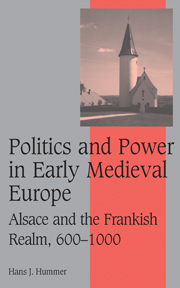Book contents
- Frontmatter
- Contents
- List of maps and tables
- Preface and acknowledgements
- List of abbreviations
- INTRODUCTION
- 1 THE LATE MEROVINGIAN ORDER
- 2 CONQUEST AND CONTINUITY
- 3 THE CAROLINGIANS AND ECCLESIASTICAL PROPERTY
- 4 REACTION AND RESISTANCE
- 5 THE POLITICS OF OLD GERMAN
- 6 IMPERIAL UNITY AND REGIONAL POWER
- 7 THE LATE CAROLINGIAN ORDER
- 8 THE TENTH-CENTURY TRANSFORMATION
- 9 CONCLUSIONS
- Appendix: Records of the dispute between Rodoin and Gebahart and the monastery of Weissenburg
- Bibliography
- Index
- Cambridge Studies in Medieval Life and Thought Fourth series
6 - IMPERIAL UNITY AND REGIONAL POWER
Published online by Cambridge University Press: 16 July 2009
- Frontmatter
- Contents
- List of maps and tables
- Preface and acknowledgements
- List of abbreviations
- INTRODUCTION
- 1 THE LATE MEROVINGIAN ORDER
- 2 CONQUEST AND CONTINUITY
- 3 THE CAROLINGIANS AND ECCLESIASTICAL PROPERTY
- 4 REACTION AND RESISTANCE
- 5 THE POLITICS OF OLD GERMAN
- 6 IMPERIAL UNITY AND REGIONAL POWER
- 7 THE LATE CAROLINGIAN ORDER
- 8 THE TENTH-CENTURY TRANSFORMATION
- 9 CONCLUSIONS
- Appendix: Records of the dispute between Rodoin and Gebahart and the monastery of Weissenburg
- Bibliography
- Index
- Cambridge Studies in Medieval Life and Thought Fourth series
Summary
By all appearances Carolingian rulers from Charles Martel to Louis the Pious had united the Frankish world under their stern lordship. Potential rivals and factions had been suppressed, the fortunes of great families were made or unmade according to the needs of royal power, abbots and bishops became partners in rulership and, perhaps most importantly, Carolingians were victorious in battle. Carolingian rulers also presided over a sweeping reform of the Frankish church and society which reached its apogee in Louis the Pious's reform councils (816–19) and his elegant conception of a ‘Christian Empire’.
Working to undermine imperial unity were a number of structural tensions. The transition from expansion under Charlemagne to defence under Louis the Pious diminished opportunities to acquire the spoils necessary for maintaining the patronage networks that sustained the imperial edifice. As the flow of plunder and tribute dissipated, aristocrats began to vie for honores and wealth within the empire. It probably is no coincidence, as Timothy Reuter has observed, that this competition for internal wealth was marked by a noticeable uptick in allegations of abuse of church property. These complaints were not driven by antagonism between clerics and the laity; they were a predictable byproduct of the political empowerment of abbeys during the Carolingians' rise to power and the elaboration of a flexible system of property transfers that bound kin-groups, monks, kings and imperial aristocrats to one another.
- Type
- Chapter
- Information
- Politics and Power in Early Medieval EuropeAlsace and the Frankish Realm, 600–1000, pp. 155 - 208Publisher: Cambridge University PressPrint publication year: 2006



